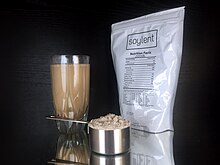
Back بديل الوجبات Arabic Sustituto alimenticio Spanish Toidukorra asendaja Estonian جایگزین وعده غذایی Persian Ateriankorvike Finnish Substitut de repas French Pengganti makanan ID 完全食 Japanese 식사대용품 Korean Заменители еды Russian

A meal replacement is a drink, bar, soup, etc. intended as a substitute for a solid food, usually with controlled quantities of calories and nutrients. Some drinks come in powdered form or pre-mixed health shakes that can be cheaper than solid foods with identical health qualities. Medically prescribed meal replacement drinks include the body's necessary vitamins and minerals.[1] Bodybuilders sometimes use meal replacements, not formulated for weight loss, to save food preparation time when eating 5-6 meals a day.[2]
In Europe, weight-reduction meal replacements intended to either supplement ("Meal replacement for weight control") or totally replace ("Total diet replacement for weight control") normal meals are regulated as to their energy content, the nutrients they must provide, and information and advice on packaging by EU Directive 96/8/EC of 26 February 1996 on foods intended for use in energy-restricted diets for weight reduction.[3] For example, a meal replacement must provide the minimum specified amounts of various vitamins and minerals and contain between 200 and 400 food calories of energy, of which no more than 30% can be from fat. Labeling information is prescribed, and packaging must provide a statement that the product should not be used for more than three weeks without medical advice in order to protect users from inadvertent malnutrition.
In the United States, the term "meal replacement" is not defined in federal Food and Drug Administration regulations but generally refers to a calorie-controlled, prepackaged product in the form of a bar or beverage (ready-to-drink or powder), that is meant to replace a higher calorie meal. Meal replacement products are usually fortified with more than 20 vitamins and minerals at "good" or "excellent" source levels. Meal replacement products can be regulated as conventional or functional foods.[4] In Canada, meal replacements are regulated by the Canadian Food Inspection Agency and must meet minimum calorie, protein and vitamin requirements, causing some American products to be rejected.[5][6]
- ^ Drink Yourself Skinny, Men's Health, archived from the original on 2009-12-13
- ^ Meal Replacement Guide, Bodybuilding For You
- ^ "EC Directive 96/8/EC on foods intended for use in energy-restricted diets for weight reduction".
- ^ "Regulatory Issues: Meal Replacements – Convenience or Compromise?". Food Processing. Archived from the original on 2013-08-15. Retrieved 2013-05-31.
- ^ Axon, Samuel (23 October 2017). "Canadian regulators have blocked Soylent, producers say". Ars Technica. Archived from the original on 3 February 2018. Retrieved 24 October 2017.
- ^ "Meal Replacements". Canadian Food Inspection Agency. 2014-02-28. Retrieved 24 October 2017.
© MMXXIII Rich X Search. We shall prevail. All rights reserved. Rich X Search